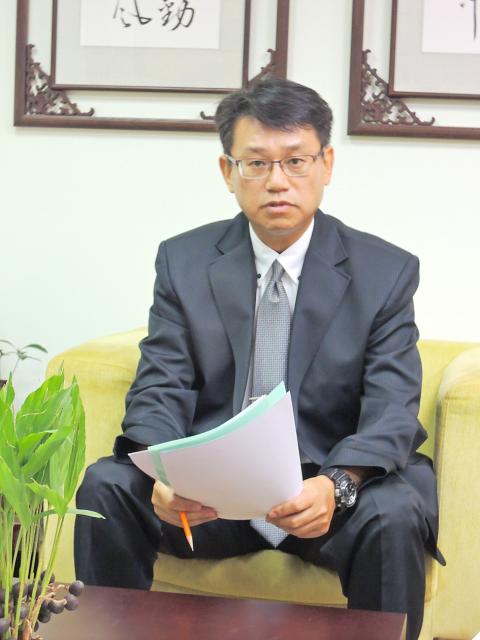The Kaohsiung District Court yesterday sentenced three naval officers to prison terms ranging from 14 months to two years over the mistaken launch of a missile that killed a fishing boat captain and injured three others in waters off Penghu County last year.
The officers were convicted on charges of causing death by negligence, the court said in its ruling.
Petty Officer Second Class Kao Chia-chun (高嘉駿), who fired the Hsiung Feng III anti-ship missile on July 1 last year, was sentenced to 18 months in prison.

Photo: Huang Chien-hua, Taipei Times
Kao’s supervisor, Chief Petty Officer Chen Ming-hsiu (陳銘修), was sentenced to two years, while Lieutenant Junior Grade Hsu Po-wei (許博為), who was in charge of weapons on the Chinchiang-class corvette, was jailed for 14 months.
The locally developed missile was mistakenly launched from the corvette docked at a naval base in Kaohsiung during what was supposed to be a simulated test.
The missile traveled northwest and ripped through the fishing boat Hsiang Li Sheng 40 nautical miles (74km) off Penghu, killing its captain, Huang Wen-chung (黃文忠), and injuring Huang’s son and two migrant workers on board.
On the morning of July 1, Chen requested four “fuse” safety connectors from Hsu to simulate a missile launch, the court said.
Hsu agreed to Chen’s request, even though he should have known that only two of the Hsiung Feng III missiles on the corvette had test and training sets (TTS) installed and only two safety connectors were needed for the test, it said.
After obtaining the connectors, Chen ordered his subordinates to link them to the four Hsiung Feng III missiles, even though he knew that two of the missiles did not have TTS on them, the court added.
After completing a missile circuit test, Chen did not notice that the missile control system was set to “combat mode” instead of “training mode,” it said.
He then left the war room for five to seven minutes, leaving Kao alone in the room simulating the missile launch procedure, it added.
Kao did not notice that two of the missiles were in “live-fire” mode and pressed the launch button for the No. 3 missile, the court said.
The missile traveled for about two minutes before reaching waters near Penghu, where it automatically searched for a target and ripped through the fishing boat.
Kao admitted to his negligence after the incident, while Chen and Hsu denied any wrongdoing, the court said in its verdict.
When asked why Kao received a lighter sentence, judge Yeh Wen-po (葉文博) said the degree of Chen’s negligence was more severe and he has refused to admit any wrongdoing, leading to the heavier sentence.
Huang Wen-chung’s family received state compensation of more than NT$30 million (US$989,936 at the current exchange rate) following the incident and reached a settlement with the Ministry of National Defense.
The Navy Command Headquarters yesterday released a statement saying that it respects the court’s ruling and would provide legal assistance to the officers.
Kao’s lawyer said Kao will decide whether to appeal after receiving the official verdict.

The CIA has a message for Chinese government officials worried about their place in Chinese President Xi Jinping’s (習近平) government: Come work with us. The agency released two Mandarin-language videos on social media on Thursday inviting disgruntled officials to contact the CIA. The recruitment videos posted on YouTube and X racked up more than 5 million views combined in their first day. The outreach comes as CIA Director John Ratcliffe has vowed to boost the agency’s use of intelligence from human sources and its focus on China, which has recently targeted US officials with its own espionage operations. The videos are “aimed at

STEADFAST FRIEND: The bills encourage increased Taiwan-US engagement and address China’s distortion of UN Resolution 2758 to isolate Taiwan internationally The Presidential Office yesterday thanked the US House of Representatives for unanimously passing two Taiwan-related bills highlighting its solid support for Taiwan’s democracy and global participation, and for deepening bilateral relations. One of the bills, the Taiwan Assurance Implementation Act, requires the US Department of State to periodically review its guidelines for engagement with Taiwan, and report to the US Congress on the guidelines and plans to lift self-imposed limitations on US-Taiwan engagement. The other bill is the Taiwan International Solidarity Act, which clarifies that UN Resolution 2758 does not address the issue of the representation of Taiwan or its people in

US Indo-Pacific Commander Admiral Samuel Paparo on Friday expressed concern over the rate at which China is diversifying its military exercises, the Financial Times (FT) reported on Saturday. “The rates of change on the depth and breadth of their exercises is the one non-linear effect that I’ve seen in the last year that wakes me up at night or keeps me up at night,” Paparo was quoted by FT as saying while attending the annual Sedona Forum at the McCain Institute in Arizona. Paparo also expressed concern over the speed with which China was expanding its military. While the US

SHIFT: Taiwan’s better-than-expected first-quarter GDP and signs of weakness in the US have driven global capital back to emerging markets, the central bank head said The central bank yesterday blamed market speculation for the steep rise in the local currency, and urged exporters and financial institutions to stay calm and stop panic sell-offs to avoid hurting their own profitability. The nation’s top monetary policymaker said that it would step in, if necessary, to maintain order and stability in the foreign exchange market. The remarks came as the NT dollar yesterday closed up NT$0.919 to NT$30.145 against the US dollar in Taipei trading, after rising as high as NT$29.59 in intraday trading. The local currency has surged 5.85 percent against the greenback over the past two sessions, central